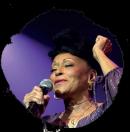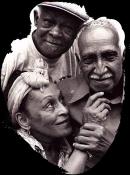- Omara Portuondo, Three times
What most clearly defines Omara Portuondo is her Cubanness, which does not imply isolation, but assimilation and opening from and towards universal channels.
A proof of this is in the young days of the singer, when she approached American popular music, particularly blues and jazz. She did it with the so-called muchachos del filin (the Filin boys) - José Antonio Méndez, César Portillo de la Luz, Angelito Díaz, Niño Rivera, etc., with the dancers from the Havana neighborhood of Santa Amalia, with young girls like her - Elena Burke and Vilma Valle - who later would also be privileged voices of the Cuban song.
She was summoned to join the quartet of Orlando de la Rosa and later, together with Haydée and Elena, guided by television producer Amaury Pérez, they went in search of Aida Diestro, who was already talking to Moraima Secada. The Las D'Aida quartet was born, and Omara took a leap in quality.
Omara, as a songwriter, definitely convinced the Cubans with her boleros and songs of all genres. She is also the ductile Omara that adapts to any voice or instrument.
Of course, we will not miss to mention the Omara from Buenavista Social Club. BSC and Omara, the Novia del Filin (the Bride of Filin,) they both have conquered the world at a stroke of novelty.


























































